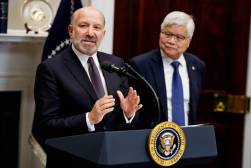‘Status quo is not an option’ for digital divide, state services

Lloyd Levine certainly has seen the technological evolution. As government attempts to keep up with advancements in technology and provide the public with equal access to devices and high-speed internet, he can still remember using a dial-up modem.
Today, Levine oversees startup accelerators and research facilities as part of his job as an executive at T-Mobile, where he’s pushing to bring the capabilities of fifth-generation cellular technology to the public sector.
“[5G] takes your ability to get the benefits of high-speed data, high-speed connectivity, video chat, whatever it might be, out of being anchored to a location,” Levine said during the IT Modernization Summit broadcast by StateScoop and EdScoop on Tuesday.
Levine said 5G will transform government’s digital services and help update old technology so that agencies can keep pace with private sector developments.
He’s not alone in believing in the importance of government keeping its systems modern.
California Chief Information Officer Liana Bailey-Crimmins, who also spoke during the online summit, said she thinks the next five years will be more disruptive to digital services than the past 20, due to generative artificial intelligence. She said the only way governments can prepare for such changes is through a shared vision and strategy.
“The status quo is not an option,” she said. “Digital services must meet Californians where they are by being flexible and human-centric, where we remember at the end of the day, we have humans on the other side of that computer.”
Another important task for both Bailey-Crimmins and Levine is bridging the digital divide, the unequal access to technology across the country and around the world.
Bailey-Crimmins recalled news stories circulated during the COVID-19 pandemic of school children logging into their digital classrooms from a Taco Bell parking lot.
“It pulled on my heartstrings,” she said.
In 2020, 11 million students didn’t have access to the internet at home, compromising their future education and job opportunities. In California, one in five people currently lack reliable or affordable internet access.
Levine said while most people only use government services sporadically, lower income individuals and seniors engaging with the health care system can use them every week.
“Those are the very same people who, according to the Pew Research Center, are the least likely to have connectivity,” he said.
The solution, Levine claimed, is to provide lower income individuals with devices paid for by the government and easy access to digital services.
This strategy has worked in Washington, where the state issued 2,000 5G phones with unlimited hotspot data to qualified veterans through the Digital Navigator Program at the Department of Veteran Affairs. The phones provide a reliable internet connection fully funded by the government.
“So if you need to know where veterans homes are, there’s an app that says, ‘Veterans Homes.’ If you need benefits assistance, there’s an app that says ‘Benefits Assistance,’ Levine said. “These are customized apps that are created in partnership with the state to provide a direct connection to the services these individuals need.”
As leaders in government determine the best strategy to modernize digital services, Bailey-Crimmins said she wants them to remember, “There is no equity without digital equity.”






